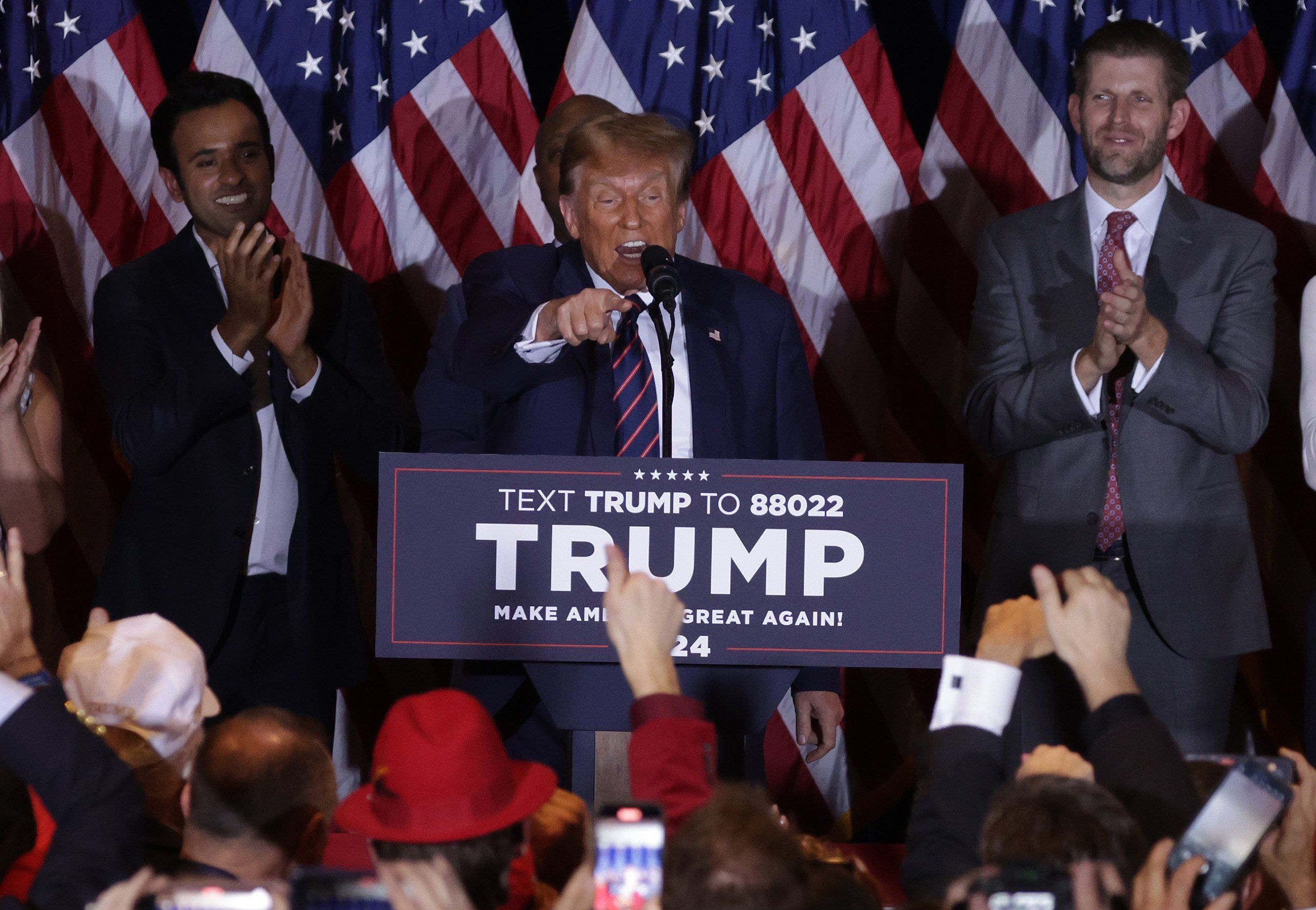Trump goes silent on ‘serious voter fraud’ after long trashing New Hampshire as ‘rigged’

During the last two presidential election cycles, former President Donald Trump spread false tales about Massachusetts voters traveling by bus to illegally vote in New Hampshire.
He repeated disproven statements around “serious voter fraud,” “massive election fraud” and a “rigged election” where he claimed votes were mysteriously found in New Hampshire and “thousands and thousands of people coming in from locations unknown.”
The timing of these lies? After he lost New Hampshire in both the 2016 and 2020 general elections.
But Tuesday night, Trump won the New Hampshire Republican primary, with the Associated Press declaring him the winner over his remaining opponent, Nikki Haley. He currently has 54.4 percent of the vote with 96 percent of votes counted, according to the AP.
So did Trump again decry out-of-state-voters and widespread election fraud?
Nope. In victory, Trump all but silenced his election rigging claims.
Trump’s campaign did not immediately respond to Raw Story’s request for comment.
ALSO READ: Trump pulls ‘end my campaign’ fundraising scare tactic again
“It’s not surprising at all,” said Kaivan Shroff, press secretary for Dream For America, a group that aims to mobilize young progressive voters, and former digital organizer for Hillary Clinton’s 2016 presidential campaign.
“It’s just another example of just how empty and disingenuous this attack is and almost really ludicrous because can they point to one change? One thing that was different about this process that would have made voting more secure? Not that there was a security issue to begin with,” Shroff continued. “I think that sort of poll narrative is getting much weaker by the minute.”
Amber McReynolds, a former director of elections in Denver and member of bipartisan reform group Issue One’s National Council on Election Integrity, was in New Hampshire for the primary to observe the electoral administration process.
“I can’t think of a statement that I’ve heard that [Trump] has said about the election process that has been true,” McReynolds said.
ALSO READ: Racism, fascism and cruelty: Donald Trump’s New Hampshire performance in nine quotes
McReynolds said New Hampshire stands out in terms of its primary elections by giving its voters early access to candidates as the first-in-the-nation nominating contest for both Republicans and Democrats. The state also allows independent voters to participate in the primaries.
Independent voters, who make up 40 percent to 45 percent of New Hampshire’s electorate during most election cycles, must choose to participate in either the Republican or Democratic election.
“New Hampshire, it’s actually a good state in that they provide access to those unaffiliated voters that now make up the largest voting bloc in the country,” McReynolds said.
Still, in his victory speech Tuesday night in Nashua, N.H., Trump fumbled the facts, falsely claiming that Democrats were allowed to vote in the Republican primary, with thousands of Democrats casting Republican ballots as far back as October.
“They’re only voting because they want me to look as bad as possible,” Trump said, proceeding to claim he won the state’s general presidential elections both in 2016 and 2020. While Trump won the Republican primaries in New Hampshire both of those years, he lost the state in both general elections.
McReynolds pointed out that New Hampshire has various polling place safeguards common across other states, such as pretest requirements for voting equipment, post-election audits and robust voter check-in procedures where voters confirm their addresses match what’s registered in the poll books.
New Hampshire has a paper ballot audit trail, and most voters in the state used paper ballots, she said. Absentee ballots are available for those who request them, and polling places offer accessible voting equipment for those who need it, she said.
Trump’s false claims around voter fraud has “deteriorated trust amongst all different sorts of voters” and “deteriorates the process and frankly can discourage participation,” McReynolds said.
“It seems to me that his claims around fraud or issues with the election tie directly into whether or not he wins a state or not, or wins a primary or not,” McReynolds siad. “It’s not based on fact, it’s based on an outcome, and if he wins, he seems fine, and if he doesn’t win, he makes various claims.”
Patricia Crouse, adjunct professor of political science at the University of New Haven in Connecticut, said Trump’s victory meant “he doesn’t have to rationalize losing” with an abundance of voter fraud claims.
Instead of fabricating voter canards, Trump instead bashed Haley, who refused to quit the race and yield to Trump despite her second-place finish.
“It’s not enough for him to win. He has to diminish anyone around him that could possibly be gaining momentum,” Crouse said.
Crouse said Trump’s voter fraud voter rhetoric could backfire on Republicans as it did in Georgia in 2020. Trump warned of voter fraud in the state and turnout was subsequently down, costing the GOP two Senate seats, Crouse said.
But even advice for Trump of “you really should tone this down. You really should not be pushing this stuff about voter fraud, when we know it doesn’t exist. It’s been proven not to exist,” likely won’t change his tune, she said.
“This is just going to be a part of his campaign, just like it was in 2020, and I don’t think anything’s going to change that,” Crouse said. “My concern is that voters get tired of listening to it and just opt out.”

